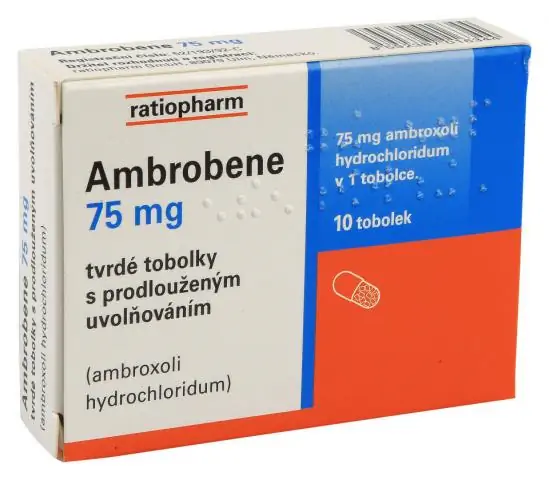- Author Rachel Wainwright wainwright@abchealthonline.com.
- Public 2023-12-15 07:39.
- Last modified 2025-11-02 20:14.
Indigocarmine
Indigocarmine: instructions for use and reviews
- 1. Release form and composition
- 2. Pharmacological properties
- 3. Indications for use
- 4. Contraindications
- 5. Method of application and dosage
- 6. Side effects
- 7. Overdose
- 8. Special instructions
- 9. Application during pregnancy and lactation
- 10. Use in childhood
- 11. In case of impaired renal function
- 12. Drug interactions
- 13. Analogs
- 14. Terms and conditions of storage
- 15. Terms of dispensing from pharmacies
- 16. Reviews
- 17. Price in pharmacies
Latin name: Indigocarmin
ATX code: V04CH02
Active ingredient: indigo carmine (indigo carmine)
Manufacturer: Ellara LLC (Russia)
Description and photo updated: 12.07.2018

Indigocarmine is a diagnostic drug used in studies of renal excretory function.
Release form and composition
Dosage form - injection solution: dark blue liquid (1-5 ampoules in blisters, 1 or 2 packs in a cardboard box; 10 ampoules in a cardboard box with a corrugated insert).
Composition of 1 ml solution:
- active substance: indigo carmine - 4 mg (in terms of dry matter);
- auxiliary components: sodium formaldehyde sulfoxylate dihydrate - 0.5 mg; sodium hydroxide sesquihydrate - 1 mg; water for injection - up to 1 ml.
Pharmacological properties
Pharmacodynamics
Indigo carmine is a diagnostic agent from the group of dyes. The use of the drug is based on the ability to be rapidly excreted in the urine unchanged without leading to impaired renal function.
Pharmacokinetics
Indigo carmine is excreted mainly by the kidneys (the blue color remains). Elimination begins within 10 minutes after administration. The half-life is approximately 4-5 minutes.
Indications for use
Indigocarmine is prescribed for studies of renal excretory function, including renal pelvis and ureters, and dynamic activity of the renal pelvis and ureters.
Also, the drug is used to visually determine the length of the fistulous passages and violations of the integrity of the cavity organs.
Contraindications
- burdened history of adverse reactions with the introduction of Indigocarmin;
- pregnancy and lactation;
- age up to 18 years;
- individual intolerance to the components of the drug.
Patients with renal insufficiency should be diagnosed with Indigocarmin with caution.
Instructions for the use of Indigocarmin: method and dosage
Method of administration of the solution: intracavitary, intravenous, into the fistulous passages.
The drug must be heated to 37 ° C before use.
Application options:
- intravenously slowly: 5-20 ml, if intravenous administration is not possible, the solution is injected intramuscularly in a volume of 20 ml (with a decrease in the rate of appearance of the drug in the urine). Observation of the excretion of Indigocarmin in the urine is carried out using a cystoscope. With normal renal function, the paint from the ureters begins to stand out after 2-3 minutes, the maximum excretion is observed after 6-8 minutes, and ends after 1-1.5 hours. In the presence of impaired renal function, excretion is less intensive and more prolonged;
- into fistulous passages, intracavitary: 5 ml, the drug can be administered undiluted or after dilution in 0.9% sodium chloride solution of 400 mg.
Side effects
Possible side reactions: increased blood pressure, idiosyncrasy, allergic reactions.
Overdose
Overdose cases are not described.
If an overdose is suspected, symptomatic therapy should be carried out.
special instructions
In some cases, during the use of Indigocarmin, blood pressure may increase.
The drug is used only in stationary conditions.
Application during pregnancy and lactation
The drug is contraindicated for use during pregnancy and lactation.
Pediatric use
Indigocarmin is not prescribed for children under 18 years of age.
With impaired renal function
In patients with renal insufficiency, the drug should be administered with caution.
Drug interactions
Indigocarmine is pharmaceutically incompatible with drugs other than 0.9% sodium chloride solution.
Analogs
There is no information on analogues of Indigocarmin.
Terms and conditions of storage
Store in a place protected from light at a temperature of 15-25 ° C. Keep out of the reach of children.
Shelf life is 2 years.
Terms of dispensing from pharmacies
Dispensed by prescription.
Reviews about Indigocarmine
Reviews of Indigocarmine are few, since the drug is used only in stationary conditions during diagnostic studies. It is rarely used today.
Price for Indigocarmine in pharmacies
The price of Indigocarmine (10 ampoules of 5 ml each) ranges from 6200 to 8100 rubles.

Maria Kulkes Medical journalist About the author
Education: First Moscow State Medical University named after I. M. Sechenov, specialty "General Medicine".
Information about the drug is generalized, provided for informational purposes only and does not replace the official instructions. Self-medication is hazardous to health!






